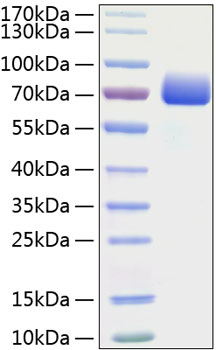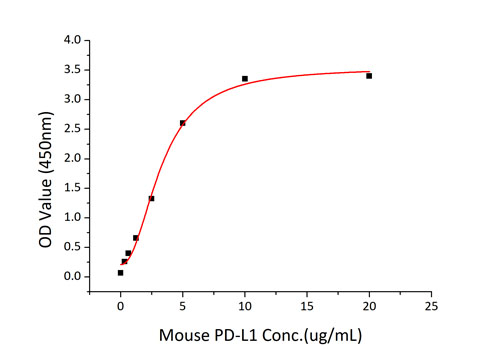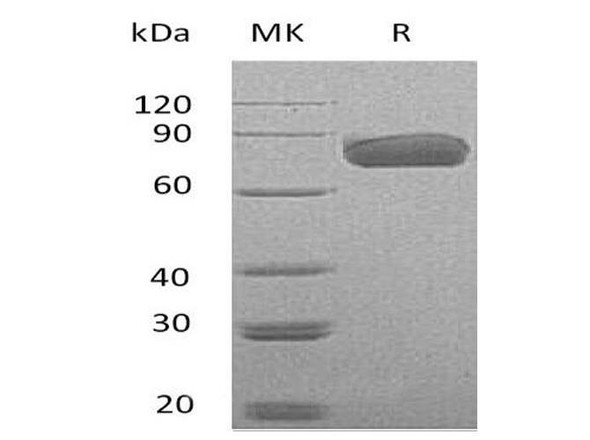Description
Recombinant Mouse B7-H1/PD-L1/CD274 Protein
The Recombinant Mouse B7-H1/PD-L1/CD274 Protein is a high-quality recombinant protein designed for murine biological research applications. This protein serves as an essential reagent in mouse model studies, comparative immunology research, and preclinical therapeutic evaluations, enabling scientists to investigate B7-H1/PD-L1/CD274 biology and its relevance to human disease mechanisms through translational research approaches.
This product (SKU: RPCB0836) is produced using HEK293 cells and features a C-hFc&His tag for convenient detection and purification. The protein exhibits a calculated molecular weight of 51.54 kDa with an observed molecular weight of 70-90 kDa under denaturing conditions, achieving ≥ 95 % as determined by SDS-PAGE.. Functional bioactivity has been validated through rigorous quality control assays, confirming its suitability for demanding research applications.
Key Features
| High Purity by Affinity Chromatography | |
| Mammalian & Bacterial Expression Systems | |
| High lot-to-lot consistency via strict QC |
| Product Name: | Recombinant Mouse B7-H1/PD-L1/CD274 Protein |
| SKU: | RPCB0836 |
| Size: | 10 μg , 20 μg , 50 μg , 100 μg |
| Reactivity: | Mouse |
| Synonyms: | PD-, B7h1, Pdl1, Pdcd1l, Pdcd1l1, Pdcd1lg1, A530045L16Rik, CD274 |
| Tag: | C-hFc&His |
| Expression Host: | HEK293 cells |
| Calculated MW: | 51.54 kDa |
| Observed MW: | 70-90 kDa |
| Gene ID: | 60533 |
| Protein Description: | High quality, high purity and low endotoxin recombinant Recombinant Mouse B7-H1/PD-L1/CD274 Protein (RPCB0836), tested reactivity in HEK293 cells and has been validated in SDS-PAGE.100% guaranteed. |
| Endotoxin: | < 0.1 EU/μg of the protein by LAL method. |
| Purity: | ≥ 95 % as determined by SDS-PAGE. |
| Formulation: | Lyophilized from a 0.22 μm filtered solution of PBS, pH 7.4.Contact us for customized product form or formulation. |
| Bio-Activity: | Measured by its binding ability in a functional ELISA. Immobilized Recombinant Mouse PD-1 at 10 μg/mL (100 μL/well) can bind Recombinant Mouse PD-L1 with a linear range of 1.5-5 μg/mL. |
| Reconstitution: | Centrifuge the vial before opening. Reconstitute to a concentration of 0.1-0.5 mg/mL in sterile distilled water. Avoid vortex or vigorously pipetting the protein. For long term storage, it is recommended to add a carrier protein or stablizer (e.g. 0.1% BSA, 5% HSA, 10% FBS or 5% Trehalose), and aliquot the reconstituted protein solution to minimize free-thaw cycles. |
| Storage: | Store at -20℃.Store the lyophilized protein at -20℃ to -80 ℃ up to 1 year from the date of receipt. After reconstitution, the protein solution is stable at -20℃ for 3 months, at 2-8℃ for up to 1 week. |
Programmed death-1 ligand-1 (PD-L1, CD274, B7-H1) has been identified as the ligand for the immunoinhibitory receptor programmed death-1(PD1/PDCD1). PD-L1/B7-H1 is expressed by hematopoietic and non-hematopoietic cells, such as T cells and B cells and various types of tumor cells. PD-L1/B7-H1 is a member of the growing B7 family of immune molecules that has immunoglobulin V-like and C-like domains. Interaction of this ligand with its receptor inhibits T-cell activation and cytokine production. During infection or inflammation of normal tissue, this interaction is important for preventing autoimmunity by maintaining homeostasis of the immune response. In tumor microenvironments, this interaction provides an immune escape for tumor cells through cytotoxic T-cell inactivation. Expression of this gene in tumor cells is considered to be prognostic in many types of human malignancies, including colon cancer and renal cell carcinoma.








